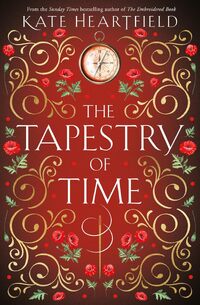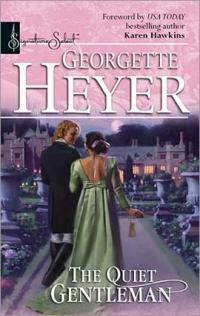 THE TAPESTRY OF TIME |
 Sunshine, secrets, and swoon-worthy stories—June's featured reads are your perfect summer escape. |

Purchase
Signature Select Showcase Romance Series, Romance Historical Excerpt of The Quiet Gentleman by Georgette HeyerIN THE guide-books it figured as Stanyon Castle; on the tongues of the villagers, it was the Castle; the Polite World spoke of it as Stanyon, as it spoke of Woburn, and of Cheveley. It was situated in Lincolnshire, not very many miles from Grantham, rather nearer to Stamford: a locality considered by those who were more interested in the chase than in any particular grandeur of scenery to be admirable. It had more claim to be called a Castle than many another nobleman's seat. A mediaeval fortress, of which various not very interesting records were to be found in the muniment room, now used by Mr. Theodore Frant as an office, had previously stood upon the site; and such portions of the ancient building as had survived the passage of time had been incorporated into the Tudor manor which had succeeded the fortress. Later generations had enlarged and beautified the structure much as their fancies dictated, any difficulty of adding to the mansion being overcome by the designing of another court. The Frant who survived friendship with Bluff King Hal scandalized his generation by the lavish use of oak for wainscoting; his grandson, having enjoyed the advantages of travel, built a new wing, and embellished the old with gildings and painted ceilings; a later Frant, succumbing to the prevailing fashion, ran riot in the rococo style, created the Fountain Court, and was prevented only by death from attempting something of a still more grandiose conception; his heir, one of Mr. Walpole's more fervid adherents, reverted to the Gothick, and by the time an unlucky fall at a regular stitcher, when out with the Old Club, put a period to his career, nowhere in England could have been found such massive doors of oak, such ponderous iron latches, so many pointed, narrow windows, as at Stanyon. The sixth Earl of St. Erth, possibly thinking that his principal seat already sprawled over too much ground, more probably prevented from adding a wing in the Palladian style by the straitened times in which he had the ill- fortune to live, contented himself with rebuilding the stables, papering a great many of the rooms, and installing a closed-stove in the enormous kitchen. This was declared by an embittered valet to be the only sign of modern civilization in the entire pile; but the head-cook, mistrusting modernity, allowed it to be used merely for the boiling of vegetables by one of his underlings, while he himself continued to preside over his furnace, with its antiquated ovens, its huge spits, and its iron cauldrons. Unaccustomed guests, wandering distractedly down ill-lit galleries, discovering stairs that led only to uncharted domestic regions, and arriving, flustered and exhausted, where they had been for long attended, had been known to express astonishment that anyone should choose to live in such a rabbit-warren when he owned two other and more convenient country residences. Neither of these, it was true, could boast of Great Halls, Minstrels' Galleries, Armouries, Towers, or Moats: on the other hand, no draughts whistled down their passages; no creeping chill arose from damp walls; and their chimneys very rarely smoked. Neither the sixth Earl nor his second wife perceived anything amiss with Stanyon: the Earl because it was the home of his childhood, his lady because she had been bred in an even more inconvenient mansion in the bleak north, and would, in any event, have unhesitatingly bartered comfort for pomp, had she been offered a choice in the matter. The Earl's first wife had hated Stanyon. But the Earl's first wife, though admittedly a lady of birth and quite remarkable beauty, had proved herself to have been quite unworthy of the high position she was called upon to fill. Before her son was out of leading-strings, she ran away with a notorious rake. Her lord, cuckolded, betrayed, and turned into a laughing-stock, expunged her name from the family records, permitted no mention of her to be made within his walls, and scarcely thought himself avenged when he learned that she had died, three years after her flight, in conditions of distress and hardship. His steward and his housekeeper, both persons of sentiment, hoped that upon his death-bed he would remember her, and speak of her with a forgiving tongue, for it seemed to them incredible that so gentle and lovely a lady should hold no place in his heart or memory. They even indulged their fancies by supposing that his overt dislike of his elder son was caused by the secret pangs the sight of the fair boy, who was indeed the image of his mother, caused him to feel. But if the Reverend Felix Clowne, my lord's Chaplain, was to be believed, the Earl's last coherent speech, forcibly phrased if feebly uttered, was a complaint that the wine he had commanded his valet to bring to his room was corked. He had earlier bestowed his blessing upon Martin, his younger son; he had had a kind word for Theodore, his nephew; he had taken punctilious leave of his lady; he had sent proper messages to his married daughter; but the names of his first wife and of his heir had not passed his lips. Nor had his heir arrived at Stanyon to attend his deathbed, although it was certain that Mr. Theodore Frant had sent a letter express to him in Flanders, warning him that his father's demise was imminent. CaptainViscount Des-borough, as he then was styled, was at Mons, with his regiment, and it was conceivable that a high sense of his military duties had prevented him from applying for furlough at a moment when Napoleon was almost hourly expected to cross the frontier. But the seventh Earl, surviving a minor, but rather bloody, engagement at the village of Genappe, and a major engagement at Waterloo, still showed no disposition to return to the home of his ancestors. He sold out, but he remained on the Continent, reposing the fullest confidence in his cousin's ability to administer his estates. Not until twelve calendar months had passed since his father's death did his cousin, and the Dowager Countess, receive tidings from him that he was in England, and about to take possession of his inheritance. He wrote a very civil letter to his mother-in-law, informing her of the proposed date of his arrival at Stanyon, and enquiring in the politest way after her health, and the healths of his half- brother and sister. It was a very pretty letter, the Dowager allowed, but, she added, in unhopeful accents, his mother had had just such caressing ways, and had shown herself to be a Snake in the Bosom. "I should perhaps warn you, ma'am, that my cousin will not relish animadversions upon the character of his mother," said Mr. Theodore Frant, a little tight-lipped. "In his presence, such remarks should be spared." "My dear Theo," responded the Dowager, "it would be odd indeed if I were to be obliged to consult you on the observances of civility!" He bowed, and, because she cherished no ill-will towards him, she said graciously: "Or anyone else, I am sure! In this house, Desborough — or, as I must learn to call him, St. Erth — may be sure of every attention called for by his consequence." "Just so, ma'am," Mr. Frant said, bowing again. "Providence has decreed that he should succeed to his dear father's honours," pronounced the Dowager, thinking poorly of Providence. "One might have supposed that military service in the Peninsula — a very unhealthy locality, I understand, setting aside the chances of Violent Death in an engagement, which cannot be altogether precluded — might have rendered the present occasion unnecessary. But it was not to be! Had my advice been sought, I should have considered myself bound to state that a military career, for one whom I should have had no hesitation in declaring to be far from robust, could be little short of Fatal! That, my dear Theo, I must have said, for, whatever must be my maternal feelings, if there be one thing upon which I pride myself it is my observance of my duty as a Christian! Happily, as it then seemed (though, according to the workings of an inscrutable fate, it now appears to be a circumstance of little moment), my advice was not sought. Since Lady Penistone chose to interest herself so particularly in her grandson, and my dear husband saw nothing objectionable in the connection, it was not for me to raise my voice. On her head, I said at the time, be the outcome! No doubt her ladyship is a good enough sort of a woman in her way: I do her the justice to acknowledge that she did not, as one might have feared she would, from the incurable levity of her behaviour, condone her unhappy daughter's misconduct: but if she petted and indulged Desborough from any other motive than a malicious desire to tease my poor husband I shall own myself astonished! A spiritless boy, I always thought him, with too much reserve to be pleasing. His career at Eton, you know, was quite undistinguished: a very odd sort of a soldier he must have been!" "It is some years since you have seen my cousin, ma'am," Mr. Frant interposed, in a measured tone. "I hope," said the Dowager, "I am not to be blamed for that! If Lady Penistone chose to invite the boy to stay with her during his school-vacations, and my lord to acquiesce in the arrangement, I take heaven to witness that it was by no expressed wish of mine that Desborough ceased to regard Stanyon as his natural home! On every head my conscience is easy: while he was a child I did my duty towards him; and I am determined now that as no word of censure for his conduct in absenting himself from a beloved parent's obsequies shall be permitted to pass my lips, so also no mark of the respect due to the Head of the Family shall be unobserved. I shall receive him in the Hall." This momentous decision being faithfully adhered to, a chilly afternoon in spring saw five persons assembled in what had once been the Great Hall of the Castle. The artistic energies of several generations had largely obliterated most of its original features, but the hammer- beams in its lofty roof remained, and a vast fireplace, made to accommodate the better part of several tree- trunks. The carved screens, having been discovered to have become worm-eaten, had been removed in a previous age, the apartment being thrown open to the vestibule, or entrance- hall, situated at right-angles to it. From this smaller apartment the Grand Staircase, erected in the latter half of the seventeenth century on a scale designed to allow some dozen persons to walk up it abreast, rose in one imposing flight to a broad half-landing, whence it branched to right and left, thus attaining the main gallery of the Castle. Several massive doors strengthened by applied iron-straps, besides the great front-door opposite to the staircase, opened on to the vestibule, a circumstance which added nothing to the comfort of the Hall, in itself a passage to a series of saloons beyond it. The heat thrown out by the logs burning in the fireplace was considerable, but was unavailing to prevent the draughts sweeping through the room. These seemed to come from all quarters, even the heavy curtains which had been drawn across the windows composing almost the entire long wall opposite the fireplace being continually stirred by them. It was dusk, and candles had been lit in the sconces as well as in the several candelabra which stood on the various tables. The little tongues of flame flickered continually, causing the wax to melt unevenly, and making it impossible for one of the persons assembled in the Hall to set the stitches in her embroidery with any degree of accuracy. Having twice changed her seat to no purpose, she folded the work, and replaced it in a tapestry-bag, drawing forth, in its stead, a prosaic piece of knitting, with which she proceeded to occupy herself, in the manner of one prepared to make the best, without comment, of adverse conditions. Excerpt from The Quiet Gentleman by Georgette Heyer |
|
| |||
|
||||



 © 2003-2025
© 2003-2025